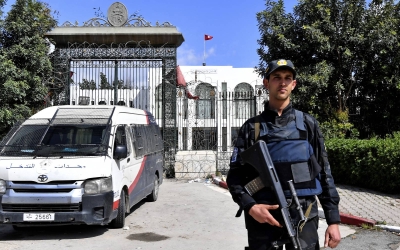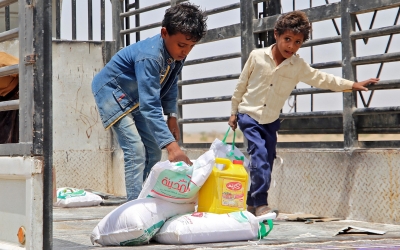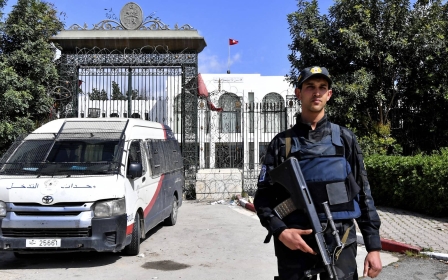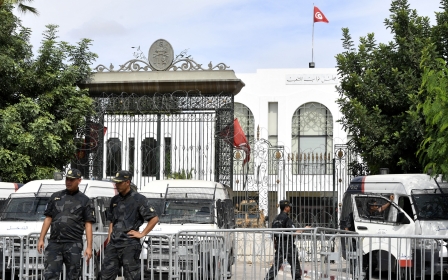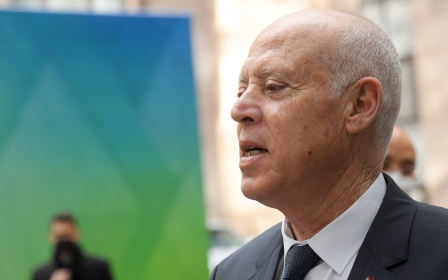Tunisia: 'Food crisis inevitable' as Ramadan begins
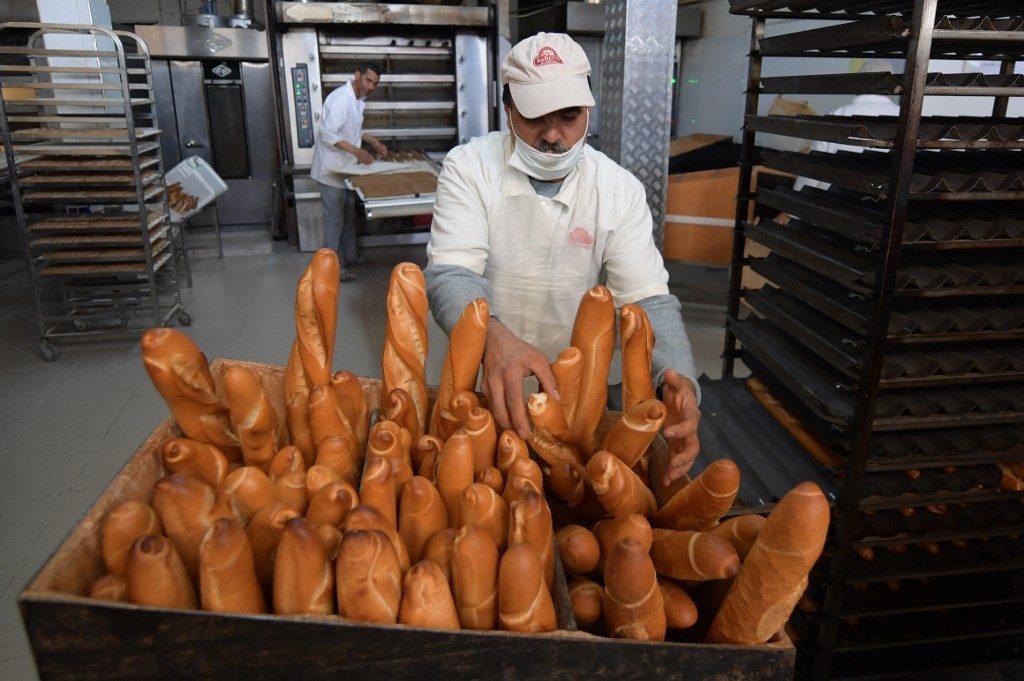
In Tunisian supermarkets, shelves have been empty for several weeks. Flour, rice, semolina, sugar and eggs are almost impossible to find.
"We restock the flour section several times a day and, just moments later, it’s all gone," Khairi, who works at a branch of the Carrefour supermarket in Greater Tunis, tells Middle East Eye.
'I get about half my usual delivery of flour. By nine in the morning, it’s already all gone'
- Amor, baker in Sidi Bouzid
In a local neighbourhood greengrocer the scenario is the same: "Who wants the last packet of flour?" a Tunisian grocer asks his customers.
To find bread, a mainstay in the Tunisian diet, you have to get up early. Every day, long queues stretch outside bakeries, while bakers have less and less bread to sell.
“I get about half my usual delivery of flour. By nine in the morning, it’s already all gone," says Amor, a baker in the thronging central Sidi Bouzid market, where the 2011 protests took place.
Exasperated bakers in the Ben Arous governorate in southern Tunisia threatened strikes in mid-March.
Scenes of stampeding crowds have also been doing the rounds on social media. A video filmed in Sidi Bouzid shows a crowd climbing aboard a lorry delivering semolina - people lunge for the piles of huge bags.
As staples become scarcer, prices spiral. In non-subsidised bakeries, the price of bread has risen 25 percent in the past few months, as a consequence of the war in Ukraine and wheat price volatility. The price of a barrel of oil is also rocketing.
"This situation didn’t just come out of nowhere. What’s been happening for two months, we’ve been predicting for a year," Houssem Saad, a member of Alert, an association combating the s0-called windfall economy in Tunisia that benefits well-connected business families, tells MEE.
An ‘explosive’ situation
Saad's collective has been warning for several years about the structural risks of the Tunisian food system, which is based on imports and crony capitalism.
The Carnegie Middle East Center has warned that Tunisia's financial crisis combined with the economic impact of Russia’s invasion of Ukraine could make the situation "explosive".
For Layla Riahi, a member of the Tunisian Platform of Alternatives, a legal NGO, "the food crisis is inevitable".
The Tunisian food supply chain is dangerously reliant on imports. The country looks overseas for more than half of its durum wheat - used to make pasta, semolina and other products - and for 97 percent of the soft wheat it needs to meet demand for bread, according to the most recent figures of the Grains Office, and corroborated by Alert.
Since December 2019, due to its lack of financial stability, the Tunisian government has been forced to pay cash for each import and no longer has the right to import on credit. Now funds are depleted and the goods are held offshore pending payment.
“Ships can be held offshore for five to six weeks waiting for the Grains Office to negotiate a high-interest loan with a private bank, at a cost ranging from $15,000 to $20,000 per day, which in turn increases the price of the imports," says Saad.
A significant part of the perishable foodstuffs go mouldy before being offloaded.
Half of the soft wheat that Tunisia usually imports comes from Ukraine.
But since the invasion of Ukraine by Russia, the world's first and fifth largest exporters of wheat respectively, the markets have been volatile, with the price of a bushel of wheat (27kg) increasing by almost 40 percent between mid-February and early March.
"The bullets and bombs in Ukraine might lead to a world food crisis of unprecedented levels," the UN World Health Organisation has warned.
Tunisia is now struggling to keep pace. On 11 March, the Cereals Office failed to conclude a deal for May's wheat imports because it didn’t have the financing in place.
"Right now, global demand is very high, and suppliers are dealing with the good payers before the bad payers," says Saad, who has been tracking food supply via the country's ports.
Current wheat reserves should last until the end of May, he says, while for sugar, tea and rice, "we have enough to last until June".
Rationing and the police response
For several weeks now, signs have been appearing on supermarket shelves: "Maximum 2kg of sugar, rice and flour per customer."
Bakers have also started to ration bread.
“We’re entering a time of rationing and it’s going to go on for a while," says Riahi.
For the moment stocks are holding out, she says, "but rationing has been brought in to avoid the Tunisian government having to pay out more in subsidies to mitigate the price increase".
To encourage the public to reduce their consumption, the health ministry has published dietary advice: "Sugar, salt and fried foods are bad for you, reduce your intake and live better."
‘We stopped eating meat a long time ago, then we cut out fish. If they take our bread, we’ll have nothing left’
- Marwa, teacher
Saad is unconvinced. "How does that kind of advice work, while shortages are so severe and people [are] finding it ever more difficult to feed themselves?"
In the run-up to Ramadan, shoppers tried to stock up whatever the cost.
But as shortages loom, this is exactly what the Tunisian government has been trying to discourage.
The national guard, police and even sometimes the army have been deployed to control those who President Kais Saied calls "speculators", intermediaries who hold on to stocks of foodstuffs to force prices up.
In reality, however, "the police swoop in on people who have amassed only a small stock, it’s absurd," says another member of Alert, who asked to remain anonymous.
The interior minister welcomed, for example, the seizure of 5,503 litres of vegetable oil, a derisory amount in the context of national consumption, which is some 240,000 tonnes per year.
"The people who are withholding raw materials are, first and foremost, the large industrial operators and food processors: take a peek inside the tuna and sardine factories, that’s where you’ll find a big part of the subsidised oil," says Saad.
"This crisis is now stripping us of the very last shreds of our dignity. We stopped eating meat a long time ago, then we cut out fish. If they take our bread, we’ll have nothing left," says Marwa, a 36-year-old teacher.
For Riahi, this crisis is an opportunity to review the entire food supply chain: "There’s a change of course needed in agriculture and food policy, and it’s urgent.”
This change can only be achieved, according to her, by dismantling the "three or four cartels" that monopolise the country's food industry. “We need to stop subsidising consumption and start subsidising production," she says.
Investing in local grains, letting Tunisian farmers run the land, reviewing water policy - these steps will build food sovereignty and improve consumption quality, she says.
"If we don’t rethink all these things, they will remain social issues forever coming back to bite us."
This article originally appeared on Middle East Eye's French website.
Middle East Eye propose une couverture et une analyse indépendantes et incomparables du Moyen-Orient, de l’Afrique du Nord et d’autres régions du monde. Pour en savoir plus sur la reprise de ce contenu et les frais qui s’appliquent, veuillez remplir ce formulaire [en anglais]. Pour en savoir plus sur MEE, cliquez ici [en anglais].


